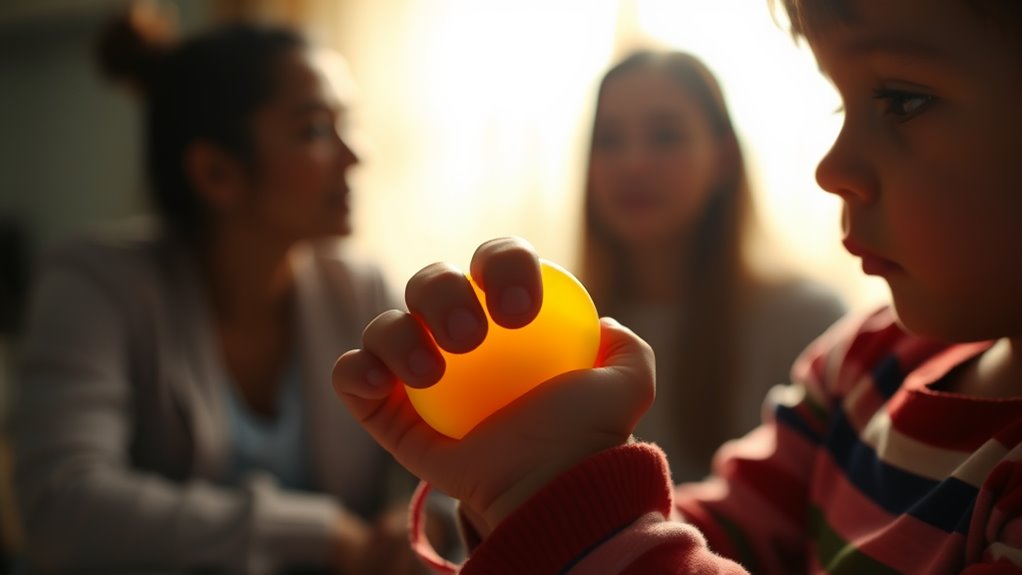10 Things Every Parent Should Know About Child Milestones
As a parent, understanding child milestones is vital for guiding your child’s growth. These key markers help you track development in areas like motor skills, language, and social interactions. From smiling and crawling in the first year to sharing and problem-solving skills by age five, every stage matters. Keep an eye out for red flags, such as limited vocabulary, and consult your pediatrician if needed. Early intervention can make a significant difference in your child’s future. By learning how to foster development through play and activities, you’ll empower your child to reach their fullest potential. More insights await you ahead!
Key Takeaways
- Child milestones are key indicators of physical, cognitive, and social development, essential for tracking a child’s progress.
- Monitoring milestones helps identify potential delays early, allowing for timely intervention and support.
- Engaging in play fosters emotional bonds and promotes critical skills, making it vital for healthy development.
- Parents should consult pediatricians if concerns arise, especially regarding speech, communication, or motor skills.
- Regular assessments and celebrating achievements encourage further exploration and learning in children.
Understanding Developmental Milestones
Developmental milestones are key markers in a child’s growth, typically occurring at specific ages. These milestones help you gauge whether your child is developing skills in areas like motor functions, language, and social interactions.
Understanding these markers is crucial for effective milestone tracking, which can reveal if your child is meeting expected developmental stages.
When you monitor your child’s progress, you’re not just taking notes; you’re actively participating in their growth journey. Milestone tracking allows you to identify any potential developmental delays early on.
If you notice your child isn’t hitting certain milestones by the expected ages, it might be time to consult a pediatrician or early childhood specialist.
Key Milestones by Age
As your child grows, you’ll notice key milestones that mark their development at various ages. These milestones serve as essential markers of progress and can help you understand your child’s growth patterns.
From birth to age 3, you’ll see rapid changes—infants typically learn to smile, crawl, and take their first steps.
By age 4, you might notice improvements in language skills, as your child starts using complete sentences and expressing ideas.
As they reach age 5, social skills begin to blossom, with children playing cooperatively and sharing with peers.
Between ages 6 to 8, academic skills emerge, and you’ll see them grasping basic math concepts and reading simple books.
Physical Development Indicators
During the early years, physical development indicators are crucial for tracking your child’s growth and abilities. You’ll want to pay close attention to both gross motor and fine motor skills, as they’re essential for everyday activities and overall health.
Gross motor skills involve larger movements, like crawling, walking, running, and jumping. By age one, your child should be able to pull themselves up and maybe even take a few steps. By age two, they should be running and climbing with more confidence. Keep an eye out for these milestones, as they indicate your child’s developing strength and coordination.
Fine motor skills, on the other hand, focus on smaller movements involving hands and fingers. Early on, you might notice your child grasping objects or bringing their hands to their mouth. As they grow, by age three, they should be able to stack blocks, manipulate toys, and even use utensils while eating.
Encouraging activities like drawing or playing with building blocks can help enhance these skills.
Tracking these indicators helps you understand where your child is in their development and allows you to provide the right support as they grow.
Cognitive Development Signs
Cognitive development signs reveal how your child is learning to think, understand, and interact with the world around them. As a parent, you’ll notice these signs emerge at different stages.
For instance, when your child begins to solve simple puzzles or figure out how to reach a toy, they’re developing essential problem-solving skills. This type of thinking often starts around the age of one, as they experiment with cause and effect.
Memory retention also plays a critical role in cognitive development. By age two, you might observe your child recalling familiar routines or remembering where they left their favorite toy. These milestones indicate that their memory is strengthening, allowing them to process information more effectively.
As your child grows, you’ll see more complex cognitive abilities, such as counting, recognizing shapes, and even understanding basic concepts like time.
Encouraging activities like reading together or playing memory games can further enhance their cognitive skills. Pay attention to these signs, as they’ll help you gauge your child’s development and provide valuable opportunities for growth.
Social and Emotional Growth
While you’re focusing on cognitive development, it’s equally important to observe your child’s social and emotional growth. Social interactions begin as early as infancy, where your baby might smile or coo at familiar faces. As they grow, they’ll start to engage more with peers, showing curiosity about other kids.
It’s essential to encourage playdates and group activities to help your child learn about sharing, cooperation, and conflict resolution.
Emotional regulation is another crucial aspect of their development. You might notice your child experiencing strong emotions, from joy to frustration. Helping them label these feelings can foster better emotional understanding.
When they’ve a tantrum or show signs of anxiety, teaching coping strategies—like deep breathing or counting to ten—can be invaluable.
As your child navigates their social world, keep an eye on their ability to empathize and respond to others’ emotions. Encourage them to express their feelings verbally rather than through actions.
Language Development Expectations
Your child’s language development is a fascinating journey that unfolds from their earliest days. During the first year, you’ll notice them cooing and babbling, starting the initial language acquisition stages. By around six months, they’ll likely begin to recognize sounds and patterns in speech, laying the groundwork for future communication skills.
As your child approaches their first birthday, expect their babbling to evolve into simple words like “mama” or “dada.” This marks a significant milestone in their language acquisition stages. By 18 months, many toddlers can say about 10 to 25 words and may start to combine words into simple phrases.
Around age two, you’ll see a burst in vocabulary, often reaching 50 words or more. They’ll begin to form short sentences, demonstrating their growing communication skills.
By age three, children typically start to use three to four-word sentences and can follow simple directions, indicating a deeper understanding of language structure.
It’s essential to engage with your child during this critical time. Reading together, singing songs, and having conversations can significantly support their language development and communication skills, helping them thrive as they grow.
Red Flags to Watch For
Watching for red flags in your child’s language development is crucial to ensuring they’re on track. Identifying potential developmental delays early can make a significant difference in your child’s progress. Here are some warning signs you should be aware of:
-
Limited vocabulary: By age two, your child should use at least 50 words. If they’re using far fewer or mostly gestures, it might be a concern.
-
Lack of interest in communication: If your child doesn’t try to engage in conversation or show interest when others speak, this could indicate issues.
-
Difficulty following directions: If your child struggles to understand simple commands or questions, it may signal developmental delays.
-
No babbling or cooing: By around six months, babies should start experimenting with sounds. If they aren’t vocalizing, it’s worth paying attention to.
Taking note of these red flags can help you determine if your child may need additional support.
Importance of Early Intervention
Recognizing red flags in a child’s development is just the first step; taking action through early intervention can significantly enhance their growth. When you notice signs that your child may not be meeting developmental milestones, don’t wait. Early screening can identify potential challenges, allowing you to address them promptly.
The sooner you act, the better the outcomes can be for your child’s future.
Early intervention provides essential developmental support, ensuring that your child gets the resources they need to thrive. This support can include therapy, specialized education, or tailored activities that encourage skill development.
Studies consistently show that children who receive early intervention are more likely to improve their skills, leading to better social, emotional, and cognitive outcomes.
Resources for Parents
Accessing the right resources can make all the difference in supporting a child’s development. As a parent, you want to ensure you’re equipped with the knowledge and tools needed to help your child reach their milestones.
Fortunately, there’s a wealth of information available to guide you through the journey.
Here are some valuable resources to consider:
-
Parenting Books: Look for well-reviewed books that cover child development stages. They often provide insights, tips, and strategies tailored to different age groups.
-
Online Forums: Joining parenting forums can connect you with other parents who share experiences and advice. It’s a great way to find support and learn from others.
-
Local Workshops: Many communities offer workshops or classes on child development. These can provide hands-on guidance and opportunities to ask questions.
-
Pediatrician Resources: Don’t hesitate to reach out to your pediatrician. They can recommend trusted materials and resources that fit your child’s specific needs.
Encouraging Healthy Development
As you gather resources to support your child’s growth, it’s just as important to actively encourage their healthy development. Engaging in playful interactions is key to fostering a sense of security and curiosity in your child. These moments not only strengthen your bond but also promote critical thinking and social skills.
Whether it’s through games, storytelling, or outdoor activities, make an effort to incorporate fun into your daily routines.
Positive reinforcement plays a crucial role in developing your child’s confidence and motivation. Celebrate their achievements, no matter how small, to show them that their efforts matter. When they try something new or reach a milestone, acknowledge it with enthusiasm. This encouragement will inspire them to continue exploring and learning.
Additionally, create an environment that supports exploration. Provide age-appropriate toys and activities that challenge your child while ensuring safety. Encourage them to ask questions and express their feelings, reinforcing that their thoughts are valued.
Frequently Asked Questions
How Can I Track My Child’s Milestones Effectively?
To track your child’s milestones effectively, use milestone checklists to assess progress regularly. Additionally, keep observation journals to note significant moments and behaviors, helping you understand their development journey and share insights with healthcare providers.
What Tools Can Help Monitor Developmental Progress?
Did you know that nearly 1 in 6 children has a developmental delay? To monitor progress effectively, use developmental checklists and growth charts, as they provide clear benchmarks and help you stay informed about your child’s development.
Are There Apps for Milestone Tracking?
Yes, there are several milestone apps available that can help you track your child’s development. Using these apps offers tracking benefits, like reminders and developmental insights, ensuring you stay informed about your child’s progress.
How Do Cultural Factors Influence Developmental Milestones?
Cultural variations significantly shape developmental expectations. In different cultures, you’ll notice diverse practices and beliefs influencing when children achieve certain milestones, affecting everything from language development to social skills and even physical abilities.
When Should I Seek a Second Opinion on Development Concerns?
If you’re worried about your child’s development, don’t hesitate. It’s better to seek a second opinion if you notice developmental red flags. Expert evaluations can provide clarity and reassurance, ensuring your child gets the support they need.





